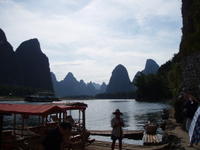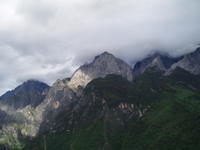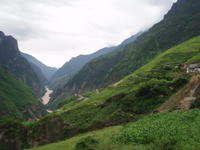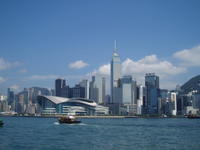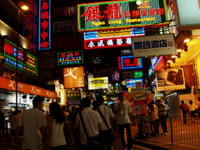Mount Kawa Karpo, a holy mountain at the entrance of Tibet
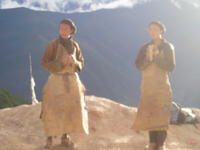 This past week has been absolutely amazing, thanks to the very unique encounters I have made along the way. After a tiring two day trek in the "Tiger Leaping Gorge," I stayed in Lijiang for a couple of days in order to plan out the rest of my farm visits. Instead of directly going back to Kunming to continue my investigation on eucalyptus and citronella oil, I decided to go North from Lijiang, to the start of the Tibetan world.
This past week has been absolutely amazing, thanks to the very unique encounters I have made along the way. After a tiring two day trek in the "Tiger Leaping Gorge," I stayed in Lijiang for a couple of days in order to plan out the rest of my farm visits. Instead of directly going back to Kunming to continue my investigation on eucalyptus and citronella oil, I decided to go North from Lijiang, to the start of the Tibetan world.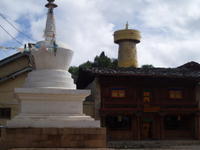 Hence, I hopped on a bus from Lijiang to Zhongdian, where I was lucky to meet an English guy who spoke perfect Chinese. Zhongdian is a small city marking the beginning of the Tibetan world. It is surrounded by treeless hills, where sheep and yaks graze freely in the middle of large white Tibetan houses, which are so welcoming with their colorfully decorated wooden doors. The dark and cloudy sky that seems so close to the ground as well as these endless fields bear the marks of a region regularly sweeped by cold waves. In the streets, most of the women wear traditional clothes, the most impressive part being their hair-do. They roll up their braided hair around a very pink hat... I'm always amazed by these women, working in the fields, carrying weights twice as heavy as them and then at night, dancing with all their energy to Tibetan tunes on the main square of the old city. During these dances, the normally quiet and empty square fills up with people, both men and women who follow each other in circles, hopping from one leg to the other. Some moves actually reminded some of Greek dancing, or it may just be the very friendly atmosphere.
Hence, I hopped on a bus from Lijiang to Zhongdian, where I was lucky to meet an English guy who spoke perfect Chinese. Zhongdian is a small city marking the beginning of the Tibetan world. It is surrounded by treeless hills, where sheep and yaks graze freely in the middle of large white Tibetan houses, which are so welcoming with their colorfully decorated wooden doors. The dark and cloudy sky that seems so close to the ground as well as these endless fields bear the marks of a region regularly sweeped by cold waves. In the streets, most of the women wear traditional clothes, the most impressive part being their hair-do. They roll up their braided hair around a very pink hat... I'm always amazed by these women, working in the fields, carrying weights twice as heavy as them and then at night, dancing with all their energy to Tibetan tunes on the main square of the old city. During these dances, the normally quiet and empty square fills up with people, both men and women who follow each other in circles, hopping from one leg to the other. Some moves actually reminded some of Greek dancing, or it may just be the very friendly atmosphere.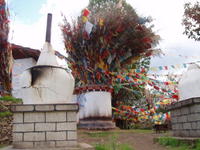 From Zhongdian we explored the biggest Tibetan monastery in the Yunnan province. This monastery looks a miniature version of the Potala palace in Lhassa. It houses about 780 monks, who may enter from the age of 5-6. As we were strolling through the many rooms of the monastery, observing Buddhist paintings representing the Buddha or Buddhist hell with a myriad of colors, we bumped into the chief monk who kindly invited us into his abode. There he offered us some tea and cheese- you all know how much I love cheese and especially stinky cheese, but this one was just pure fermented bacteria and was almost inedible.
From Zhongdian we explored the biggest Tibetan monastery in the Yunnan province. This monastery looks a miniature version of the Potala palace in Lhassa. It houses about 780 monks, who may enter from the age of 5-6. As we were strolling through the many rooms of the monastery, observing Buddhist paintings representing the Buddha or Buddhist hell with a myriad of colors, we bumped into the chief monk who kindly invited us into his abode. There he offered us some tea and cheese- you all know how much I love cheese and especially stinky cheese, but this one was just pure fermented bacteria and was almost inedible.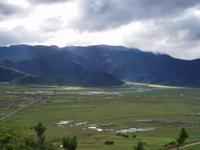 The best part of my expedition to the North-western part of Yunnan came about during the following two days. We left Zhongdian to go to Deqin, the last city in Yunnan before entering the political border of Tibet. Zhongdian and Deqin are located in this county called Shangri-la, where the majority of the population is ethnically and culturally Tibetan. On the way to Deqin, we stopped in this little village, Benzilan, lost in the middle of very dry hills covered with cacti. It was surprisingly warm in Benzilan, maybe the region has a microclimate of its own. Anyway, at times I had the impression of being in a hilly Arizona. When we arrived in Deqin, we were a bit disappointed, it was just another Chinese city. Ok, this time it was a small Chinese city (which is quite rare, at least for European city standards)- but it was a city nevertheless, busy, crazy cars, people spitting everywhere. At least it was cold, very cold and I had to wear my fleece to keep warm.
The best part of my expedition to the North-western part of Yunnan came about during the following two days. We left Zhongdian to go to Deqin, the last city in Yunnan before entering the political border of Tibet. Zhongdian and Deqin are located in this county called Shangri-la, where the majority of the population is ethnically and culturally Tibetan. On the way to Deqin, we stopped in this little village, Benzilan, lost in the middle of very dry hills covered with cacti. It was surprisingly warm in Benzilan, maybe the region has a microclimate of its own. Anyway, at times I had the impression of being in a hilly Arizona. When we arrived in Deqin, we were a bit disappointed, it was just another Chinese city. Ok, this time it was a small Chinese city (which is quite rare, at least for European city standards)- but it was a city nevertheless, busy, crazy cars, people spitting everywhere. At least it was cold, very cold and I had to wear my fleece to keep warm. 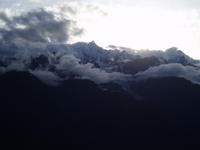 We left the city as soon as we arrived, and headed south, where we stopped 10km later, close to another monastery, but most importantly at a place where we could have a breathtaking view of the Kawa Karpo, a holy mountain that reaches heights of more than 6 000 meters. In Tibetan Buddhism, Kawa Karpo is sacred, not only because lamas used to pray and meditate in front of it, but also because to this day, no one has ever been able to reach its summit. During the last attempt, the 17 courageous climbers were killed in an avalanche, only 200 m from the top. The mysterious part is that most of the bodies haven't been recovered, and some of them have been found on the other side of the moutain...
We left the city as soon as we arrived, and headed south, where we stopped 10km later, close to another monastery, but most importantly at a place where we could have a breathtaking view of the Kawa Karpo, a holy mountain that reaches heights of more than 6 000 meters. In Tibetan Buddhism, Kawa Karpo is sacred, not only because lamas used to pray and meditate in front of it, but also because to this day, no one has ever been able to reach its summit. During the last attempt, the 17 courageous climbers were killed in an avalanche, only 200 m from the top. The mysterious part is that most of the bodies haven't been recovered, and some of them have been found on the other side of the moutain...So we sat there all afternoon, waiting for the clouds to unveil the peak of the mountain covered in snow. Apparently, in the past weeks, people had rarely been able to see the summit as the clouds always hung around it. When we arrived we could already distinguish some glaciers through the clouds... we waited and waited... and little by little the clouds moved and let us see larger parts of the mountain.
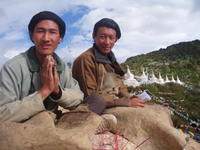 While we were waiting, we met three Tibetan pilgrims. I was quite lucky to be with Tom (the English guy who spoke Chinese) because without him I would have never been able to interact with them. Originally from Western Sichuan, the three brothers had been walking for the past 4 years on a pilgrimage to Lhassa. They walked, carrying their tent and covers and pulling their mother in a poorly made wooden cart. They had arrived in Deqin a couple of months earlier. There they started to walk around the base of the holy mountain Kawa Karpo. They went around the mountain twice, which apparently took them two months. Later, when the clouds revealed the summit of the mountain, I realized that they had been crawling (not walking) around the mountain twice. As soon as we were able to distinguish the peak, the three brothers started to bow and lie in front of the mountain, just as they did when going around it.
While we were waiting, we met three Tibetan pilgrims. I was quite lucky to be with Tom (the English guy who spoke Chinese) because without him I would have never been able to interact with them. Originally from Western Sichuan, the three brothers had been walking for the past 4 years on a pilgrimage to Lhassa. They walked, carrying their tent and covers and pulling their mother in a poorly made wooden cart. They had arrived in Deqin a couple of months earlier. There they started to walk around the base of the holy mountain Kawa Karpo. They went around the mountain twice, which apparently took them two months. Later, when the clouds revealed the summit of the mountain, I realized that they had been crawling (not walking) around the mountain twice. As soon as we were able to distinguish the peak, the three brothers started to bow and lie in front of the mountain, just as they did when going around it.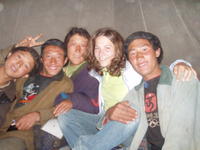 Later that night, they invited us in their tent for a cup of tea. We asked them to write down their names for us first in Chinese script and then in Tibetan. They had great pain to write in the Tibetan script. It is such a shame, and I suppose this is what happens with most minorities. Their culture is that of Tibet, they speak Tibetan at home, but at school, they only learn Chinese script... I'm not sure what role the government plays in that, but if it does then it's probably not in favor of the Tibetan culture. When we left, they gave us a prayer bracelet, one that they had kept with them during the past 4 years. I felt so inappropriate- for sure I don't deserve this gift of huge sentimental value. I was completely blown away by their devotion and their will power. Soon they will go back to Sichuan where they will work in the fields with their father.
Later that night, they invited us in their tent for a cup of tea. We asked them to write down their names for us first in Chinese script and then in Tibetan. They had great pain to write in the Tibetan script. It is such a shame, and I suppose this is what happens with most minorities. Their culture is that of Tibet, they speak Tibetan at home, but at school, they only learn Chinese script... I'm not sure what role the government plays in that, but if it does then it's probably not in favor of the Tibetan culture. When we left, they gave us a prayer bracelet, one that they had kept with them during the past 4 years. I felt so inappropriate- for sure I don't deserve this gift of huge sentimental value. I was completely blown away by their devotion and their will power. Soon they will go back to Sichuan where they will work in the fields with their father.I'm now back in Kunming- and leaving tomorrow to a small village lost in the Southern part of Yunnan, in the Xishuangbanna county. There I will work on a citronella farm for a couple of days and then visit a tropical plant research institute. At this institute, they study the potential of producing essential oils from rare tropical plants, which apparently will disappear if they are not made useful.
